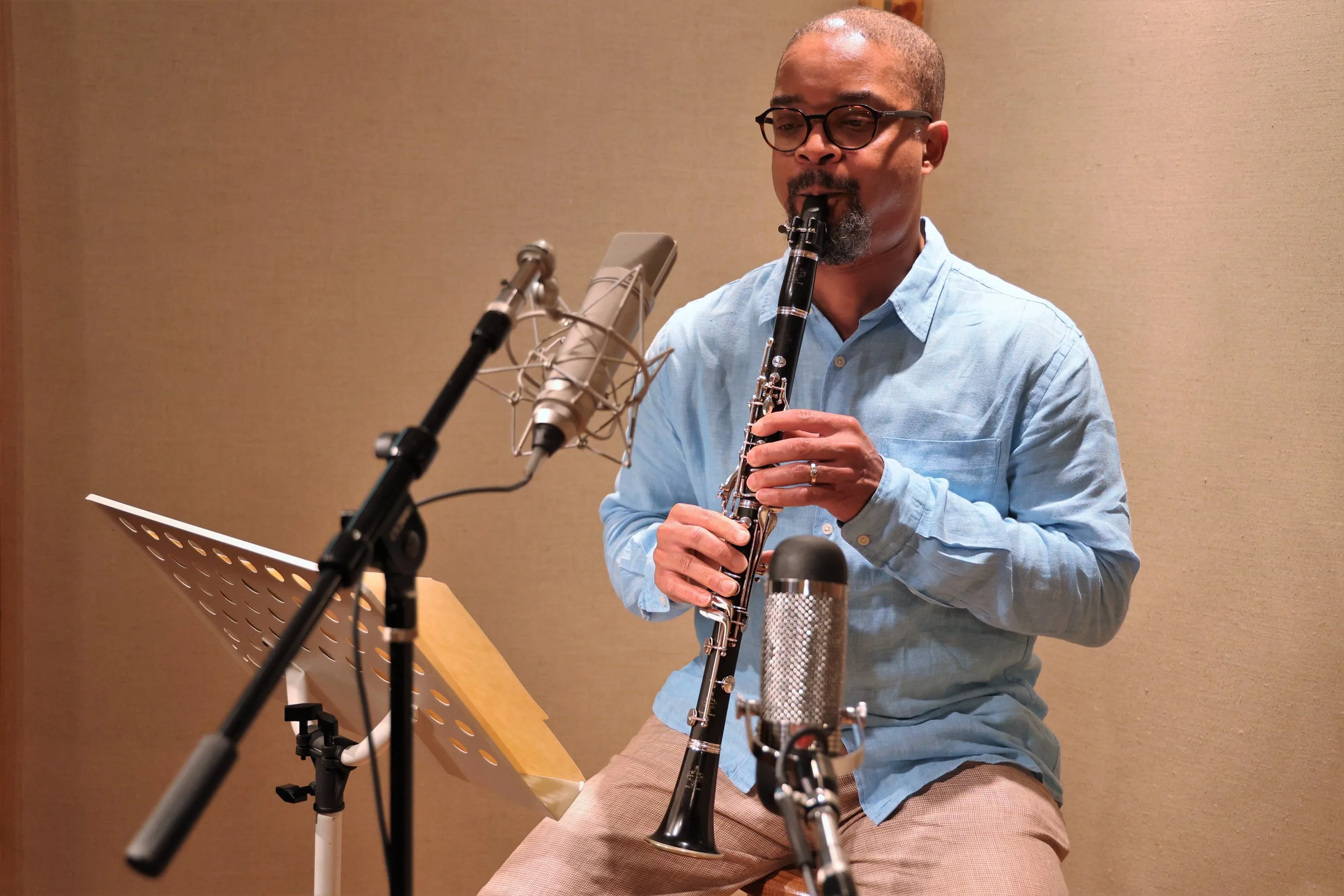$12 ADV. / $15 @ the door / $10 students
Doors open at 7pm - GA, Seated
Jazz clarinetist Darryl Harper celebrates the release of Chamber Made with a special concert.
Hailed by Jazz Observer for his “luxurious, agile and highly organic” mastery of the clarinet, Philadelphia native and Chair of Music at Amherst College Darryl Harper is proud to announce the release of Chamber Made. This riveting collection of chamber jazz works, building on Harper’s previous successes including Triphony, Stories in Real Time, The Edenfred Files and The Need’s Got to Be So Deep, prompts us to question anew the racialized boundaries erected around concert music, popular music and jazz.
Harper envisioned Chamber Made as a platform for unique composers from his peer group, including his fellow New England Conservatory students Ryan Truesdell (leader of the GRAMMY-winning Gil Evans Project) and Brian Landrus (composer and bari saxophonist who enlisted Harper for his acclaimed Generations orchestra). Truesdell’s “Suite for Clarinet and String Quartet,” showcasing Harper with the Wistaria String Quartet, receives its recording premiere on Chamber Made, as does Landrus’ “Spatial Décor,” a three-movement work for clarinet quartet featuring Harper with Alec Spiegelman, Kenny Pexton and Landrus himself.
At NEC in the mid-2000s, Harper, Truesdell and Landrus grew together in an environment historically shaped by the likes of Gunther Schuller and George Russell. They’ve long understood jazz and so-called “serious music” as a continuum, not as separate (i.e., segregated) and compartmentalized worlds. “When Ryan and I agreed to collaborate, it was from a real sense of excitement of being in conversation with that legacy,” says Harper. This work also evolves out of a past in which composers even as esteemed as Scott Joplin, James P. Johnson and Duke Ellington were excluded from the realm of “legitimate” concert music.
Harper and other Black performers have sought to bring about what Bill Gaskins, in his liner notes to Chamber Made, calls “The Sonic Democracy,” in which imposed hierarchies of musical value, often shaped by racism, give way to a truly inclusive vision. Chamber Made is in this sense part of a restorative tradition, of Black performers upending assumptions about where they “belong” in terms of genre and cultural access. “Silence,” an enthralling piece for solo clarinet by Xavier Davis (accomplished pianist with credits including Christian McBride, Betty Carter, Abbey Lincoln and Jeremy Pelt), speaks to that legacy as well, taking inspiration from Langston Hughes’ 1941 poem of the same name. (“The Need’s Got to Be So Deep,” the title track of Harper’s previous album, was Davis’ treatment of poet Yusef Komunyakaa’s “Blue Light Lounge Sutra for The Performance Poets at Harold Park Hotel.” Davis and Harper, who met in Regina Carter’s band, also forged a strong bond while co-composing the soundtrack to the 2009 film Herskovits: At the Heart of Blackness.)
Harper bookends Chamber Made with two tracks performed by The Onus Trio, a collective that has anchored Triphony, The Edenfred Files and other of the clarinetist’s outings. The appearance of this longstanding trio suggests that even a lineup as quintessentially “jazz” as horn/bass/drums can be a chamber group as well. The opening “Kaleidoscope” is originally from guitarist Freddie Bryant’s 2000 album Live at Smoke, while Stevie Wonder’s “Cash in Your Face” (from Hotter Than July) adds guest Todd Marcus (Stricker Street’s founder and proprietor) on bass clarinet.These more “jazz”-centered tracks still hint at “the fascinating question of where chamber music begins and ends,” in Harper’s words. Stevie Wonder’s lyrics, a frank indictment of anti-Black housing discrimination, also take on new meaning, as part of the album’s pushback against race-based musical exclusion.
Thanks to the expert, empathic hand of producer and engineer John Vanore, Chamber Made presents Harper’s clarinet voice in a sonically consistent way across a wide variety of settings. The audio stakes were high for the solo clarinet piece, of course, but just as central was the clarinet quartet, where the emphasis was on the players’ distinct voices, according to Harper: “We wanted you to be able to hear Alec Spiegelman, who has more of that New Orleans referent, a lot of vibrato and air in the sound. You can hear it even in the ensemble passages, just as you can still hear Brian, Kenny and me. We’re making the gestures together, but we maintain our individuality. That fits with Brian’s writing really nicely, with those intricately woven textures and counterpoint moving into sections with block harmony.”
By contrast, with Truesdell’s piece and a stable working group like Wistaria, Harper notes, “It required me to really take many steps toward them, to find out, ‘Ok, who are you as an ensemble?’ I spent a lot of time with them to try to become as much a part of their ensemble as I could.” Although the pieces are fully notated, they leave interpretation to the performer — which is why Harper succeeds so beautifully in making the language of Chamber Made so fluid, so improvisational. The key was to memorize, get off the page, hear the music rather than read it. “I see these pieces as changing overtime,” Harper marvels in conclusion. “This music involves a lot of challenges that I think will take the rest of my life to keep digging at.”
More About Darryl Harper
In addition to his work as a leader, Darryl Harper holds the clarinet chair in Jason Moran’s visionary project James Reese Europe and the Harlem Hellfighters: The Absence of Ruin. Hetoured extensively with violinist and MacArthur Fellow Regina Carter for two years and has also worked with Dee Dee Bridgewater, Roscoe Mitchell, Dave Holland, Orrin Evans, Freddie Bryant, Tim Warfield and Uri Caine. For Stricker Street in 2018, he coproduced Todd Marcus’ On These Streets and pianist Helen Sung’s Sung With Words, the latter a collaboration with renowned poetand former NEA chairman Dana Gioia.
Harper currently serves as John William Ward Professor and Chair of Music at Amherst College; prior to that he taught for 10 years at Virginia Commonwealth University in Richmond. Along with The Onus, he has led the clarinet-piano duo Into Something (with pianist Kevin Harris) and the C3 Project, an octet that presented multimedia work encompassing dance, video and poetry.





